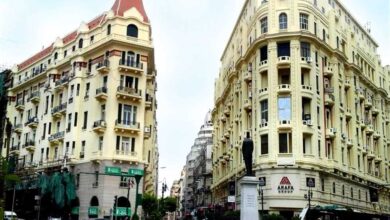As the ongoing Tahrir Square sit-in wraps up its second week, the tent city in the heart of downtown Cairo is taking on a life of its own. Now boasting a school, a cinema, a bookstore, a radio station and dozens of open-air “restaurants,” this tangled encampment in a traffic circle is starting to feel like a more permanent settlement.
"While some outsiders may view the atmosphere in Tahrir Square as festival-like, I believe it is there to prove a point,” said Mahmoud Salem, an activist who helped organize the Tahrir School. “It becomes a social experiment which can prove that, since our demands are not being met, in the meantime, we can create a more utopian microcosm of Egypt."
The sit-in began on 8 July, as thousands of Egyptians frustrated with the ruling military council returned to the square that had been the focal point of the 18-day uprising earlier this year which drove former President Hosni Mubarak from power. This time, they hoped to put pressure on military rulers to end the use of military trials for civilians, push forward trials for corrupt former officials, reform the notorious Interior Ministry, and raise other demands for substantive change.
So far the military has responded with a set of piecemeal reforms and the prime minister has proposed a cabinet reshuffle, but not enough to force demonstrators out of the square.
Organizers of the Tahrir School, which has been teaching street children between the ages of 10 and 15, said they launched the effort on Sunday evening.
"Many individuals and even organizations, such as al-Balsam Publishing House, have donated educational books to the school," Nazly Hussein, an organizer of the Tahrir School, told Al-Masry Al-Youm.
The school, which is housed in a plastic tent in the square's grassy, raised center, began its lessons with puzzles, artwork and storytelling. But organizers have more ambitious plans. "If the school continues to be successful we are hoping to delve into more educational issues such as citizenship, the environment and others," Hussein said.
After school, Tahrir’s students may feel the need for some entertainment in the form of a movie.
Just after the sit in began on 8 July, the square gained a new cultural venue near Qasr al-Nil Bridge, where films are screened nightly. The screenings, which feature edited footage from protests from January to the present, attract hundreds of viewers. They were organized by a media collective with support from a group of actors, directors and producers.
For those in Tahrir seeking a more bookish way to relax, there is the free library, also hosted in a plastic tent in the square’s center. The library has received donations from volunteers and bookstores, including the Dar El Shorouk chain, according to Galal al-Boheiry, an organizer. The collection, which includes books on liberalism, revolution in Eastern Europe and constitutions, is still small, but Boheiry hopes that it will grow in time.
Other initiatives in the square include a local radio station, "Radio al-Thawra," or Revolution Radio, which reached peaks of up to 300,000 listeners during the 18-day uprising in January and February.
“Many political debates take place and are streamed live over the internet,” said Ahmed Abdallah Abdel Salam, organizer and host of the online radio channel. “We even had famous guests like [Ghad Party leader] Ayman Nour, aspiring president in the upcoming elections.”
Protesters in the square have also created their own newspapers, theatrical shows, library, emergency clinics and pharmacies. And of course there are Tahrir’s numerous street vendors, selling everything from tea to t-shirts to grilled corn.
But if the sit-in has become a miniature society, it also faces some of the same problems that plague any other society.
In his personal blog, “Rantings of a Sandmonkey,” Salem writes that theft, crime, class divisions and human rights violations have cropped up in the square. To deal with crime, Tahrir, like any city, has its own police force and makeshift detention centers.
He emphasizes, nevertheless, that these drawbacks reflect the "brilliance" of Tahrir Square, which has shown that it can at least partially overcome such problems.
"While fissures were created, the challenges also created a huge number of alliances that were never possible before, since every group, no matter how hard they worked, started realizing that they can’t manage or carry the problems of the country alone, and that in reality, theoretical solutions are not always the most practical or effective ones," he said.
If protesters make good on a recent pledge to continue their sit-in through Ramadan, their mini settlement will likely continue to evolve in the coming month.




